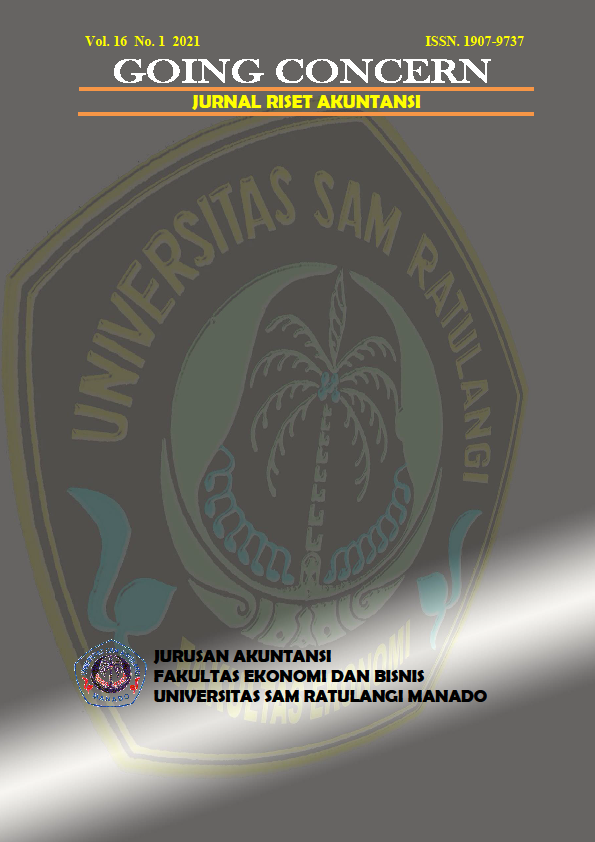DAMPAK PENERAPAN TRANSAKSI E-COMMERCE MELALUI PEMUNGUTAN PAJAK PENGHASILAN (PPh)
Keywords:
income taxes (PPh), business e-commerce, collection systemAbstract
Â
.
This study aims to analyze the implementation of income tax collection (PPh) on e-commerce transactions at KPP Pratama Pandeglang. as well as what obstacles are experienced in implementing Taxation on e-commerce transactions. The study was conducted using descriptive qualitative methods. The population of the study was 180,896, and 60 samples were taken, using the purposive sampling method. Data collected by questionnaire and observation methods, analyzed in detail. The results of the study can be concluded that: 1) Tax collection uses the Self Assessment System method, 2) Constraints in e-commerce tax collection are the e-commerce business people who have not been maximized, socialization has not been done thoroughly and e-commerce transactions that are difficult in the detection of a form of business which has its own problem, namely the difficulty of the government to establish clear and fair tax regulations.
References
Laudon, K. C., & Laudon, J. P. (2014). Management information systems: Managing the digital firm, 13th Edition. United Kingdom: Pearson Education Limited.
Makalalag, L. (2016). Pengenaan pajak penghasilan terhadap pengusaha dalam transaksi perdagangan online (E-Commerce). Legal Opinion: Jurnal Ilmu Hukum, 4(1) 1-10. https://www.neliti.com/id/publications/150702/pengenaan-pajak-penghasilan-terhadap-pengusaha-dalam-transaksi-perdagangan-onlin#cite
Mangoting, Y., & Sadjiarto, A. (2013). Pengaruh postur motivasi terhadap kepatuhan wajib pajak orang pribadi. Jurnal Akuntansi dan Keuangan, 15(2), 106-116. https://jurnalakuntansi.petra.ac.id/index.php/aku/article/view/18893
Peraturan Direktorat Jenderal Pajak Nomor PER-32/PJ/2010 Tahun 2010 tentang pelaksanaan pengenaan pajak penghasilan pasal 25 bagi wajib pajak orang pribadi pengusaha tertentu.
Peraturan Menteri Keuangan Nomor PMK Nomor 210/PMK.010/2018 tentang perlakuan perpajakan atas transaksi perdagangan melalui sistem elektronik (e-commerce).
Rahawati, L. (2016). Pengaruh jumlah wajib pajak efektif dan penagihan pajak dengan surat paksa terhadap penerimaan pajak (Studi kasus pada Kantor Pelayanan Pajak Pratama Purwakarta). Universitas Komputer. https://elib.unikom.ac.id/gdl.php?mod=browse&op=read&id=jbptunikompp-gdl-lusyrahmaw-35469&q=wajib%20pajak%20efektif
Rahmatullah, T. (2016). Analisis yuridis atas perlakuan pajak terhadap transaksi e-commerce. https://www.researchgate.net/publication/326694301_ANALISIS_YURIDIS_ATAS_PERLAKUAN_PAJAK_TERHADAP_TRANSAKSI_E-COMMERCE
Rosalinawati, E., & Syaiful, S. (2018). Analisis pajak penghasilan atas transaksi e-commerce di Kabupaten Gresik. Journal of Islamic Accounting and Tax, 1(1), 1-18. http://dx.doi.org/10.30587/jiatax.v1i1.443
Sugiyono, P. D. (2017). Metode penelitian bisnis: Pendekatan kuantitatif, kualitatif, kombinasi, dan R&D.
Surat Edaran Pajak Nomor SE-62/PJ/2013 tentang Penegasan Ketentuan Perpajakan atas Transaksi E-Commerce.
Suriyadi. (2015). Pengaturan perpajakan e-commerce dan penghindaran pajak berganda. Tesis. Universitas Airlangga. http://repository.unair.ac.id/id/eprint/33919
Syadri, M. (2017). Jawa Timur Provinsi Terbesar Ketiga Pasar E-Commerce. https://www.jawapos.com/ekonomi/bisnis/04/03/2017/jawa-timur-provinsi-terbesar-ketiga-pasar-e-commerce/
Undang-Undang No 28 Tahun 2007 Tentang Perubahan Ketiga Atas Undang-undang No.6 Tahun 1983 Tentang Ketentuan Umum dan Tata Cara Perpajakan.
Undang-Undang Nomor 36 Tahun 2008 tentang Perubahan Keempat atas Undang-Undang Nomor 7 Tahun 1983 tentang Pajak Penghasilan
Undang-Undang Nomor 7 tahun 2014 tentang Perdagangan
Utomo, E. M. (2013). Transaksi e-commerce sebagai potensi penerimaan pajak di Indonesia. Jurnal Akuntansi Akunesa, 2(1), 1-20. https://jurnalmahasiswa.unesa.ac.id/index.php/jurnal-akuntansi/article/view/6516






.png)










